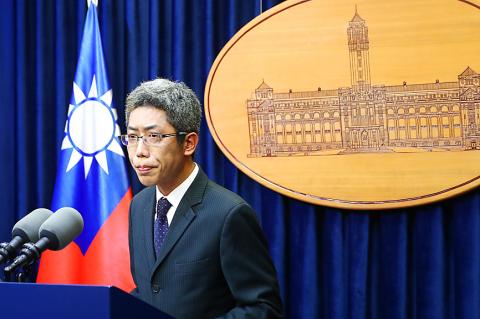China yesterday announced more measures to open its markets to Taiwanese firms and treat Taiwanese the same as Chinese, but Presidential Office spokesman Ting Yun-kung (丁允恭) said they are just a ploy to divide Taiwanese and try to influence the Jan. 11 elections.
The new measures will allow Taiwanese companies to invest or participate in projects ranging from 5G to civil aviation to theme parks, and allow them to issue bonds to raise capital.
China’s Taiwan Affairs Office (TAO) said the government would also make it easier for Taiwanese to live and work China as well as give them the right to seek consular help from Chinese embassies and consulates.

Photo: CNA
The 26 measures, which represent the “thorough implementation of [Chinese President] Xi Jinping’s (習近平) promise to provide Taiwanese compatriots with equal treatment,” came into effect immediately, the TAO said.
The offer is Beijing’s latest example of Xi’s strategy to try to bypass official contact in favor of direct incentives aimed at embroiling Taiwanese firms, organizations and the public in the Chinese market and state subsidy system.
The new measures are another attempt to sell Beijing’s “one country, two systems” formula to Taiwanese, but they actually offer few benefits and serve mainly as a way of influencing Taiwan’s elections, Ting said.
Beijing should be engaging in positive exchanges for cross-strait peace and stability, instead of launching yet another round of “favorable policies” focused on Taiwanese, he added.
The Mainland Affairs Council (MAC) said the new measures were aimed at promoting unification.
These so-called “favoring Taiwan efforts” are contradicted by Beijing’s continuing efforts to suppress this nation by grabbing its diplomatic allies, blocking its international space and conducting military exercises in the Taiwan Strait, a council statement said.
Those who go to China need to be aware of the risks and the “differences in the system,” the council added.
The Ministry of Foreign Affairs also issued a statement criticizing Beijing’s offer to allow Taiwanese in trouble abroad to seek assistance from Chinese embassies and consulates.
A source familiar with national security issues said the measures on “promoting cross-strait economic and cultural exchanges” were an attempt to implement Beijing’s “one country, two systems” in Taiwan.
They are also part of efforts by Beijing to mitigate the effects of an exodus of Taiwanese and foreign investors from the Chinese market due to the US-China trade dispute, the source said.
Taiwanese firms shifting operations to Taiwan or to Southeast Asian nations have put pressure on China, especially its technology sector, and the new steps are an attempt to counteract this situation, the source added.
“China is trying to rationalize its bullying of Taiwan on the world stage, while trying to convince Taiwanese that it is showing them benevolence,” the source said.
Former Chinese leader Deng Xiaoping (鄧小平) once promised that after the 1997 Hong Kong handover “horse races would still go on, and nightclubs would stay open,” but the current situation in the territory proves life has not continued normally, the source said.
“Lessons can been drawn from Hong Kong’s case as to what Beijing’s granting of so-called ‘national treatment’ would be for Taiwanese,” the source added.

The US government has signed defense cooperation agreements with Japan and the Philippines to boost the deterrence capabilities of countries in the first island chain, a report by the National Security Bureau (NSB) showed. The main countries on the first island chain include the two nations and Taiwan. The bureau is to present the report at a meeting of the legislature’s Foreign Affairs and National Defense Committee tomorrow. The US military has deployed Typhon missile systems to Japan’s Yamaguchi Prefecture and Zambales province in the Philippines during their joint military exercises. It has also installed NMESIS anti-ship systems in Japan’s Okinawa

‘WIN-WIN’: The Philippines, and central and eastern European countries are important potential drone cooperation partners, Minister of Foreign Affairs Lin Chia-lung said Minister of Foreign Affairs Lin Chia-lung (林佳龍) in an interview published yesterday confirmed that there are joint ventures between Taiwan and Poland in the drone industry. Lin made the remark in an exclusive interview with the Chinese-language Liberty Times (the Taipei Times’ sister paper). The government-backed Taiwan Excellence Drone International Business Opportunities Alliance and the Polish Chamber of Unmanned Systems on Wednesday last week signed a memorandum of understanding in Poland to develop a “non-China” supply chain for drones and work together on key technologies. Asked if Taiwan prioritized Poland among central and eastern European countries in drone collaboration, Lin

Renewed border fighting between Thailand and Cambodia showed no signs of abating yesterday, leaving hundreds of thousands of displaced people in both countries living in strained conditions as more flooded into temporary shelters. Reporters on the Thai side of the border heard sounds of outgoing, indirect fire yesterday. About 400,000 people have been evacuated from affected areas in Thailand and about 700 schools closed while fighting was ongoing in four border provinces, said Thai Rear Admiral Surasant Kongsiri, a spokesman for the military. Cambodia evacuated more than 127,000 villagers and closed hundreds of schools, the Thai Ministry of Defense said. Thailand’s military announced that

CABINET APPROVAL: People seeking assisted reproduction must be assessed to determine whether they would be adequate parents, the planned changes say Proposed amendments to the Assisted Reproduction Act (人工生殖法) advanced yesterday by the Executive Yuan would grant married lesbian couples and single women access to legal assisted reproductive services. The proposed revisions are “based on the fundamental principle of respecting women’s reproductive autonomy,” Cabinet spokesperson Michelle Lee (李慧芝) quoted Vice Premier Cheng Li-chiun (鄭麗君), who presided over a Cabinet meeting earlier yesterday, as saying at the briefing. The draft amendment would be submitted to the legislature for review. The Ministry of Health and Welfare, which proposed the amendments, said that experts on children’s rights, gender equality, law and medicine attended cross-disciplinary meetings, adding that